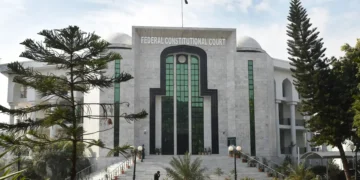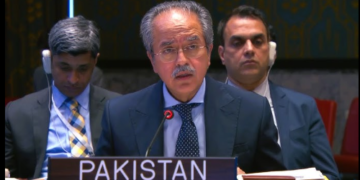By Asif Naveed
ISLAMABAD (MNN); Justice Aminuddin Khan was appointed on Thursday as the inaugural Chief Justice of the newly established Federal Constitutional Court (FCC). The appointment came shortly after President Asif Ali Zardari signed into law the 27th Constitutional Amendment and within hours of the resignations of Supreme Court Justices Mansoor Ali Shah and Athar Minallah in protest.
According to a notification issued by the Law Ministry, President Zardari made the appointment under Clause (3) of Article 175A read with Article 175C of the Constitution. The appointment will take effect upon Justice Khan’s oath-taking ceremony, scheduled to be held at the Presidency on Friday at 10 a.m., attended by the chief justices and judges of superior courts as well as senior government officials.
Born in Multan in 1960, Justice Khan is a second-generation lawyer. He obtained his LL.B. from University Law College, Multan, in 1984 and began his legal career under his father, Khan Sadiq Muhammad Ahsan. He became an advocate of the Lahore High Court in 1987 and of the Supreme Court in 2001, later joining Zafar Law Chambers in Multan. He was elevated to the bench in 2011 and took oath as a Supreme Court judge in 2019 under then Chief Justice Asif Saeed Khosa.
Justice Khan, who headed the Supreme Court’s Constitutional Bench in 2024, is currently the fourth most senior judge of the apex court. He has decided thousands of civil cases, with most of his verdicts upheld by the Supreme Court.
According to sources, the FCC will initially consist of six judges in addition to the Chief Justice — four from the Supreme Court and two from the high courts. The proposed names include Justices Hasan Azhar Rizvi, Musarrat Hilali, Aamer Farooq, and Baqar Najafi from the Supreme Court, and Justices KK Agha and Rozi Khan Barrech from the Sindh and Balochistan High Courts, respectively.
The initial strength of the court will be determined through a Presidential Order, while future expansions will require parliamentary approval. Officials confirmed that appointments would be made by the President on the advice of the Prime Minister.
The 27th Constitutional Amendment, which established the FCC, is part of a broader judicial reform agenda aimed at easing the Supreme Court’s workload and ensuring faster resolution of constitutional cases. The idea of a separate constitutional court was first proposed in the 2006 Charter of Democracy signed between the PPP and PML-N.
Under the new structure, FCC judges will retire at the age of 68 — three years later than Supreme Court judges. The new court will be housed in the current Federal Shariat Court (FSC) building in Islamabad, while the FSC will be moved to the Islamabad High Court premises. However, sources within the FSC have expressed dissatisfaction over their sudden relocation and have raised their objections with the Chief Justice of Pakistan.









































































